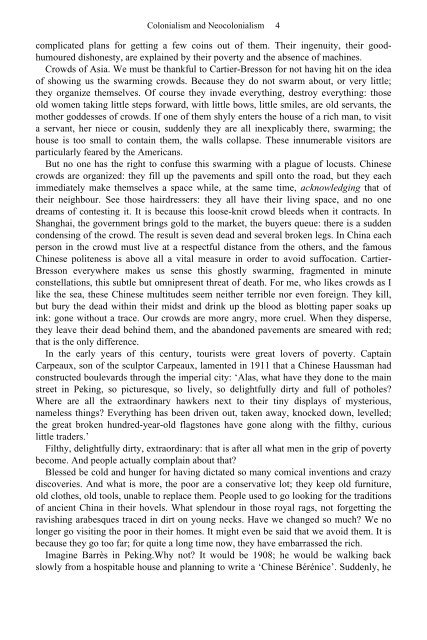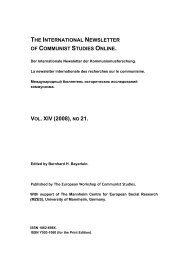11RXNdQ
11RXNdQ
11RXNdQ
You also want an ePaper? Increase the reach of your titles
YUMPU automatically turns print PDFs into web optimized ePapers that Google loves.
Colonialism and Neocolonialism 4<br />
complicated plans for getting a few coins out of them. Their ingenuity, their goodhumoured<br />
dishonesty, are explained by their poverty and the absence of machines.<br />
Crowds of Asia. We must be thankful to Cartier-Bresson for not having hit on the idea<br />
of showing us the swarming crowds. Because they do not swarm about, or very little;<br />
they organize themselves. Of course they invade everything, destroy everything: those<br />
old women taking little steps forward, with little bows, little smiles, are old servants, the<br />
mother goddesses of crowds. If one of them shyly enters the house of a rich man, to visit<br />
a servant, her niece or cousin, suddenly they are all inexplicably there, swarming; the<br />
house is too small to contain them, the walls collapse. These innumerable visitors are<br />
particularly feared by the Americans.<br />
But no one has the right to confuse this swarming with a plague of locusts. Chinese<br />
crowds are organized: they fill up the pavements and spill onto the road, but they each<br />
immediately make themselves a space while, at the same time, acknowledging that of<br />
their neighbour. See those hairdressers: they all have their living space, and no one<br />
dreams of contesting it. It is because this loose-knit crowd bleeds when it contracts. In<br />
Shanghai, the government brings gold to the market, the buyers queue: there is a sudden<br />
condensing of the crowd. The result is seven dead and several broken legs. In China each<br />
person in the crowd must live at a respectful distance from the others, and the famous<br />
Chinese politeness is above all a vital measure in order to avoid suffocation. Cartier-<br />
Bresson everywhere makes us sense this ghostly swarming, fragmented in minute<br />
constellations, this subtle but omnipresent threat of death. For me, who likes crowds as I<br />
like the sea, these Chinese multitudes seem neither terrible nor even foreign. They kill,<br />
but bury the dead within their midst and drink up the blood as blotting paper soaks up<br />
ink: gone without a trace. Our crowds are more angry, more cruel. When they disperse,<br />
they leave their dead behind them, and the abandoned pavements are smeared with red;<br />
that is the only difference.<br />
In the early years of this century, tourists were great lovers of poverty. Captain<br />
Carpeaux, son of the sculptor Carpeaux, lamented in 1911 that a Chinese Haussman had<br />
constructed boulevards through the imperial city: ‘Alas, what have they done to the main<br />
street in Peking, so picturesque, so lively, so delightfully dirty and full of potholes?<br />
Where are all the extraordinary hawkers next to their tiny displays of mysterious,<br />
nameless things? Everything has been driven out, taken away, knocked down, levelled;<br />
the great broken hundred-year-old flagstones have gone along with the filthy, curious<br />
little traders.’<br />
Filthy, delightfully dirty, extraordinary: that is after all what men in the grip of poverty<br />
become. And people actually complain about that?<br />
Blessed be cold and hunger for having dictated so many comical inventions and crazy<br />
discoveries. And what is more, the poor are a conservative lot; they keep old furniture,<br />
old clothes, old tools, unable to replace them. People used to go looking for the traditions<br />
of ancient China in their hovels. What splendour in those royal rags, not forgetting the<br />
ravishing arabesques traced in dirt on young necks. Have we changed so much? We no<br />
longer go visiting the poor in their homes. It might even be said that we avoid them. It is<br />
because they go too far; for quite a long time now, they have embarrassed the rich.<br />
Imagine Barrès in Peking.Why not? It would be 1908; he would be walking back<br />
slowly from a hospitable house and planning to write a ‘Chinese Bérénice’. Suddenly, he




